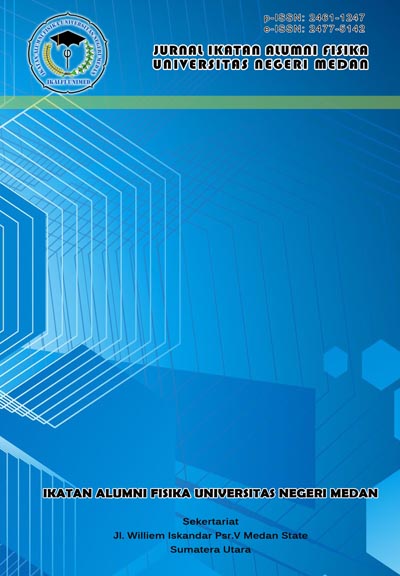PENGARUH MODEL PEMBELAJARAN PROBLEM BASED LEARNING TERHADAP HASIL BELAJAR SISWA PADA MATERI POKOK KINEMATIKA GERAK LURUS DI KELAS X SEMESTER I SMA NEGERI 1 SUNGGAL T.P. 2016/2017
DOI:
https://doi.org/10.24114/jiaf.v3i2.10736Keywords:
Problem Based Learning, learning outcomes, straight motion kinematicsAbstract
Studies conducted to determine the effect of learning model Problem Based Learning on learning outcomes of students in the subject matter kinematics of rectilinear motion in the first semester of grade X SMAN 1 Sunggal T.P 2016/2017. This type of research is quasi-experimental. Sampling was done by cluster random sampling that class as an experimental class X3 and X4 class as a class contro. The instrument used is the achievement test and observation activities. The average value of pretest kleas 23.90 experiment and control class 21.33. The second data were normally distributed and homogeneous class. T test results obtained pretest thitung <ttable (1.48881 <1.997) H0 accepted means initial ability of students in the experimental class with students in the control class. Grades given experimental treatment with a learning model Problem Based Learning and classroom control with conventional learning models. Postes given on the second class with an average yield of 68.52 experimental class and control class 62.09. And the average value of the entire student activity during the learning with the learning model Problem Based Learning is 9.01 including a very active category. While the average value of the entire student activity during the learning with conventional learning model is 7.94 including the active category. Postes data processing results obtained t> t table (8.806> 1.668) Ha accepted which means no influence of the use of learning model Problem Based Learning in the subject matter kinematics of rectilinear motion in the first semester of grade X SMAN 1 Sunggal T.P 2016/2017.References
Anderson,W.,L&David.R.,(2015). Kerangka Landasan Untuk Pembelajaran, Pengajaran dan Asesmen. Pustaka Pelajar : Yogyakarta
Dahar, R.W.,(2011). Teori-teori Belajar dan Pembelajaran. Erlangga :Jakarta
Dimyati dan Modjiono. (2009). Belajar dan Pembelajaran. PT Rineka Cipta : Jakarta
Slameto.(2003).Belajar dan Fakto-Faktor yang Mempengaruhinya. Bina Aksara: Jakarta
Sudjana,(2009). Metode Statisika. Penerbit Tarsito : Bandung
Sudjana,N.,(2009).Penilaian Hasil Proses Belajar Mengajar.PT Remaja Rosdakarya :Bandung
Trianto, (2009), Mendesain Model Pembelajaran Inovatif “ Progresif, Kencana Prenada Media Group, Jakarta.
Downloads
Published
2018-09-26
Issue
Section
Articles
License
Copyright (c) 2018 JURNAL IKATAN ALUMNI FISIKA

This work is licensed under a Creative Commons Attribution 4.0 International License.
Authors who publish with this journal agree to the following terms:- Authors retain copyright and grant the journal right of first publication with the work simultaneously licensed under a Creative Commons Attribution License that allows others to share the work with an acknowledgement of the work's authorship and initial publication in this journal.
- Authors are able to enter into separate, additional contractual arrangements for the non-exclusive distribution of the journal's published version of the work (e.g., post it to an institutional repository or publish it in a book), with an acknowledgement of its initial publication in this journal.
- Authors are permitted and encouraged to post their work online (e.g., in institutional repositories or on their website) prior to and during the submission process, as it can lead to productive exchanges, as well as earlier and greater citation of published work (See The Effect of Open Access).

